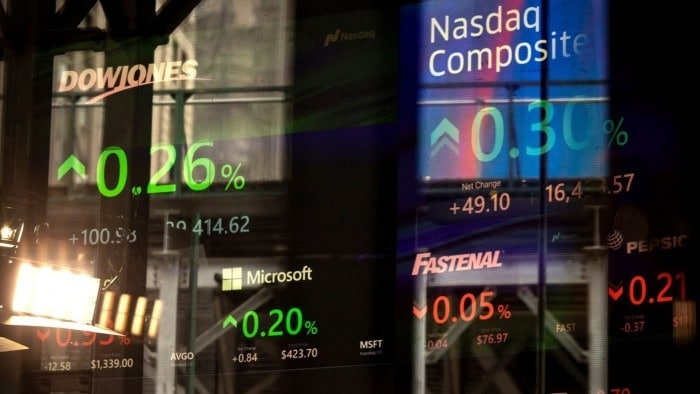Also in today’s newsletter, Biden warns Netanyahu on US support and lessons from Rwanda genocide
Good morning. The global supply of public equity is shrinking at its fastest pace in at least 25 years, as economic and geopolitical uncertainty weighs on new share sales while companies keep buying back large volumes of their own stock.
The figures, from JPMorgan analysts, confounded the bank’s own expectations and suggest a lingering lack of confidence among executives. Rising stock markets and relatively strong economies should in theory encourage companies to raise funds by selling new shares at high prices rather than spending cash to buy them back.
Yet data shows that the global universe of public equities has already shrunk by a net $120bn this year, exceeding the $40bn taken out over all of last year. That puts the net figure on course for a third consecutive year of decline — a phenomenon not seen since the bank’s data series began in 1999.
JPMorgan’s data showed buybacks this year continuing at roughly the same pace of the past three years, putting them on course to reach about $1.2tn by December. Initial public offerings and other share sales have fallen short of forecasts, however. Here’s what the “puzzling” trends mean.
And here’s what I’m keeping tabs on today and over the weekend:
- Economic data: S&P Global releases its construction purchasing managers’ index for the UK, which also has its house price index from Halifax today. Germany publishes data on February factory orders, while the US has unemployment figures.
- UK strikes: Train drivers from the Aslef union will bring some routes on the national rail network to a halt as they start the first of several strikes today.
- Zimbabwe: The southern African nation launches a new currency today backed by the country’s gold reserves to replace its collapsing dollar.
- UK tax: The new tax year starts tomorrow. Capital gains tax for property will be cut from 28 per cent at the higher rate to 24 per cent.
- Elections: Slovakia holds a second round for its presidential polls tomorrow, while Poland has local elections on Sunday.
- Daylight saving ends: Clocks are turned back one hour in Australia on Sunday.
How well did you keep up with the news this week? Take our quiz.
Five more top stories
- Joe Biden has warned that US support for Israel’s war depends on its conduct in Gaza and efforts to address the humanitarian suffering in the enclave, as he called for an “immediate ceasefire” in the conflict. The president’s comments, made during a phone call to Prime Minister Benjamin Netanyahu yesterday, come just days after Israeli air strikes killed seven aid workers in Gaza. Here’s how Israel responded to Biden’s remarks.
- UK-Israel ties: Former Supreme Court justices and an ex-MI6 head were among those piling pressure on the British government yesterday to end arms sales to Israel.
- Russia has made “thousands” of attempts to interfere with European rail networks in a campaign to destabilise the EU and sabotage critical infrastructure, according to the Czech Republic’s transport minister. Martin Kupka told the Financial Times that since Vladimir Putin’s full-scale invasion of Ukraine in February 2022, Moscow was suspected to have made “thousands of attempts to weaken our systems”.
- London’s capital markets will end up “dead” on current trends, the boss of one of the City’s biggest independent investment banks has warned. Peel Hunt’s chief executive told the FT that there was no sign of a revival in the city’s moribund market for initial public offerings. “Our industry has been dramatically hollowed out over the last five, 10 years,” he said. Read the full interview with Steven Fine.
- Larry Fink faces a proxy challenge to his dual role as chair and chief executive of BlackRock from a UK activist investor that wants more board oversight of the $10tn money manager’s approach to sustainable investing. Bluebell Capital Partners, which has $120mn in assets, also said BlackRock’s 17-member board was too large and criticised an “unequivocal failure” in governance. Here’s more on the challenge to Fink.
- Donald Trump’s bids to dismiss three of the criminal cases against him have been summarily thrown out by a trio of state and federal judges in the space of just 24 hours, delivering a new set of legal setbacks to the former president. Three different judges denied his requests on cases involving classified documents, “hush money” and election interference. Here’s the latest on Trump’s legal woes.
- Trump and Fox News: Today’s Big Read explores the uneasy truce forged between the presumptive Republican candidate and a TV network emblematic of the American right.
- US election: No Labels, the bipartisan group that had aimed to field an independent “unity ticket” in the 2024 presidential contest, has scrapped its bid, removing a threat to Joe Biden’s re-election campaign.
Sign up for our US Election Countdown newsletter for an essential guide to the twists and turns of the 2024 presidential race.
Weekend read
 The Akagera river wetlands, where many Rwandan Tutsis submerged themselves neck-deep in a bid to escape the 1994 massacres © Julien Daniel/Myop
The Akagera river wetlands, where many Rwandan Tutsis submerged themselves neck-deep in a bid to escape the 1994 massacres © Julien Daniel/Myop
How do genocides happen? From April 7 to mid-July 1994, Rwanda suffered the most sustained, rapid and focused mass murder since the Holocaust, with more than 800,000 Tutsis and moderate Hutus slaughtered by genocidaires from the majority Hutu ethnic group. As the country commemorates the fallen 30 years on, foreign editor Alec Russell asks: what is the Rwandan genocide’s legacy, and what have we learnt?
We’re also reading . . .
- US-South Africa ties: A US bill calling for relations to be reviewed would be self-sabotage for America, writes Naledi Pandor, South Africa’s foreign minister.
- Robots and ‘posties’: The Royal Mail is combining automation with its network of delivery staff to solve its competitiveness problem.
- Public debt: Jamaica halved its government debt-to-gross domestic product ratio in a decade, writes Soumaya Keynes. What can we learn from its example?
- Sunday rest spat: German courts have upheld a centuries-old rule that shops are not allowed to operate on the last day of the week — even if they are fully automated.
Chart of the day
Oil prices rose above $90 a barrel yesterday to settle at their highest closing price since October, as traders weighed the potential for Iran’s backlash after a suspected Israeli attack on its consulate in Damascus.
 Take a break from the news
Take a break from the news
Inland of South Africa’s famed coastal Garden Route, away from the cars and whale-watching tours, there is a sense of time winding down. It’s an area uniquely suited for discovery by bicycle — which is why cult adventure outfit The Slow Cyclist is now operating there. Follow HTSI’s Charlotte Sinclair as she goes on an off-map adventure in the Western Cape.
 © Kent Andreasen
© Kent Andreasen
Additional contributions from Benjamin Wilhelm and Gordon Smith



